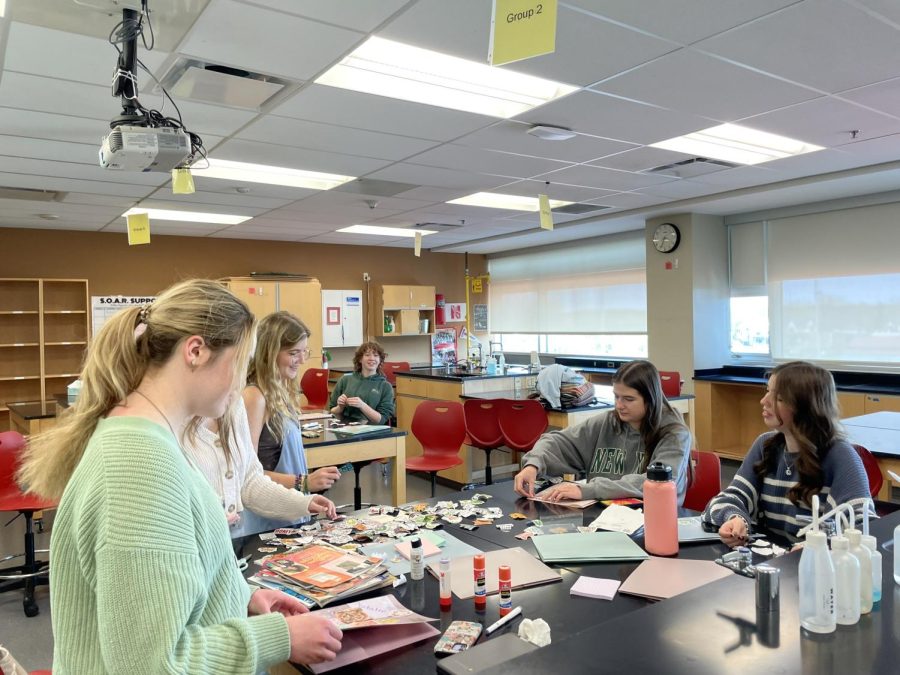Sophomore hopes to ‘eliminate diet culture’
April 28, 2023
No matter how many times she refused a snack from friends, how many hours were spent on the treadmill, or the number on the scale, it was never enough. For sophomore Natalie Egan, the urge to keep going until she was skin and bones wouldn’t leave her alone. She avoided brushing her teeth because of the fear of extra calories. The burning desire to be as skinny as possible, at the cost of starving herself, wouldn’t go away.
“I would go to school and find myself thinking about what I’m going to eat next and how many calories it might contain in order to stay within my limit,” Egan said. “It was like a toxic relationship, distracting me from everything else important.”
For Egan, schoolwork was her last priority. Unless, it was an excuse not to eat.
“[It’s] no wonder my grades weren’t the best,” Egan said. “I just wasn’t myself. I felt like a ghost trying to engage with others, stuck in my own head.”
Anorexia nervosa is an eating disorder characterized by an abnormally low body weight, an intense fear of gaining weight and a distorted perception of weight, according to the Mayo Clinic. Egan has been battling symptoms since age 10.
“It’s harder than you think it is,” Egan said. “You can’t just eat, it takes a lot of work. I had to realize that it’s something you have to recover from and it’s not just going to go away.”
Erica Kelly, certified school nurse, understands the number of students suffering with anorexia or symptoms of anorexia that she and her colleagues may not know about.
“If you’re not eating enough, if you’re not putting enough fuel in your body, you’re going to be tired,” Kelly said. “So, if all of a sudden [a student is] tired all of the time, they can’t seem to get through the day without feeling like they need to take a nap, that can be a warning sign of anorexia”
For Egan, she stopped seeing people and wouldn’t go out with friends during the beginning of her freshman year. She began hiding in her room to avoid situations with food.
According to Kelly, when someone is struggling with anorexia, friends or family members may notice the person they used to always eat with beginning to eat in isolation. Additionally, those with anorexia may lose their appetite.
“When you are restricting calories your body is saying ‘oh my gosh, I have to figure out how to best use these calories,’ the best way is to pump your heart and make your brain work.” Kelly said. “Your brain doesn’t think that digestion is quite as important, so it slows digestion down. That makes you feel fuller faster.”
To Kelly, this is part of why anorexia is not a choice. Intead, there is a real, physical, medical reason why one feels full while eating significantly less.
Kelly was a health studies major where she often learned about eating disorders. Then, when attending nursing school, she continued to learn more on the subject.
“I realized that despite all of this training that I had gotten, I still felt like I was missing something,” Kelly said.
Recently, Kelly has found a program that offers graduate-level professional development on eating disorders.
“It’s been eye-opening and I’ve just taken two of the classes so far,” Kelly said. “I can’t believe all the things that I didn’t know, after I thought I knew a whole lot.”
One of the many things Kelly has learned of is atypical anorexia nervosa. Atypical meaning the individual has maintained a normal body size but is still suffering from the same issues of anorexia. Such as, body dysmorphia or the restriction of calories.
“Because our thin ideal society believes thin equals healthy, we believe ‘Oh, great, you know, they’re probably healthier now’ when individuals lose weight,” Kelly said. “But they might actually be losing weight because of an eating disorder.”
Kelly acknowledges that even the medical profession is very weight centered.
Health at Every Size (HAES) is a paradigm Kelly believes is crucial in shifting societal standards. HAES encourages healthy eating and enjoyable physical activity. Unlike other health programs, it does not believe weight loss through dieting is the way to become healthy.
“It was not great when people would compliment my weight loss,” Egan said. “You don’t want to hear it. The eating disorder part of you wants to hear that but your true self doesn’t. It reinforces that you have to keep [losing weight] because that’s [how] you get compliments.”
A common aspect of anorexia, Kelly said, is the idea of not believing you’re sick enough. It can be a major reason why an individual may hold off on getting treatment.
Late into the fall of freshman year, Egan’s mom noticed something was wrong. After getting connected with health professionals, she’s now gone through residential education, therapy and treatment from dieticians. Treatment has helped teach Egan how to play her own role in recovery.
“People can help you, they do what they can to help you, but in the end it’s only me who can work on it,” Egan said. “And that’s what my parents have said to me over and over again.”
Egan didn’t just find herself through treatment.
“I’ve met a lot of people,” Egan said. “I’ve been to concerts with my friends from treatment. We’ve helped each other recover.”
Now recovered, Egan hopes to help others find support through her newly formed club, Nourish to Flourish. Egan wants people to learn that anorexia doesn’t always have a look, you may look healthy but not feel it. It’s never too late to reach out for help.
“You can’t compare,” Egan said. “If everyone did the same workouts and diets you would still have different bodies. You have to realize your body isn’t for display. It’s not an ornament, it’s more than that.”
On March 20, Egan held the first club meeting. The club aims to eliminate diet culture and create a body-positive environment at Central. Egan started Nourish to Flourish because she knows a lot of people struggle with mental health issues, such as body image issues, body dysmorphia and guilt with food. Nourish to Flourish is a place where people can come together and learn that they are not alone.
“I hope that people feel comfortable enough to have conversations with each other and be able to find support,” Egan said. “My goal is to find a good balance between talking and activities to achieve that support.”
Even if you’re not struggling with an eating disorder you can still support those who are. Egan said to provide your friends support. Try offering to eat with them or give them advice and if you don’t know how to try and offer them outside support.
“Diet culture is so prevalent in today’s society,” Egan said. “I think we’re getting better at identifying it but It’s still something we have to be aware of.”








